Unit 7 The Sea--高一强化提高班《英语》下学期辅导第一章第四节讲义1
- 格式:doc
- 大小:130.50 KB
- 文档页数:4
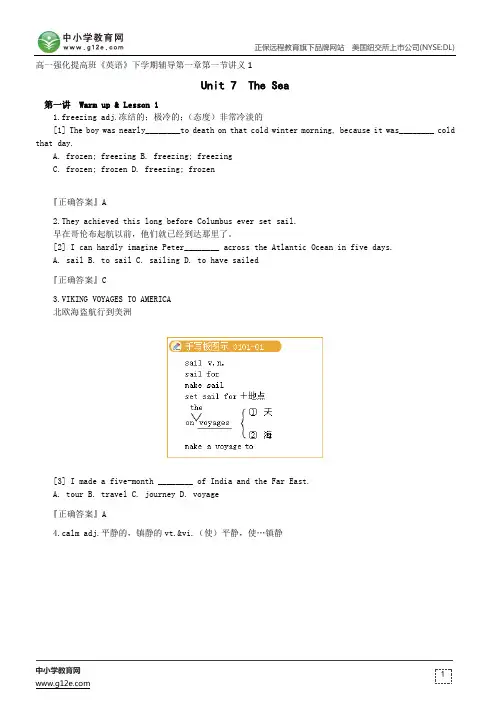
正保远程教育旗下品牌网站 美国纽交所上市公司(NYSE:DL)中小学教育网 高一强化提高班《英语》下学期辅导第一章第一节讲义1Unit 7 The Sea第一讲 Warm up & Lesson 11.freezing adj.冻结的;极冷的;(态度)非常冷淡的[1] The boy was nearly________to death on that cold winter morning, because it was________ cold that day.A. frozen; freezingB. freezing; freezingC. frozen; frozenD. freezing; frozen『正确答案』A 2.They achieved this long before Columbus ever set sail.早在哥伦布起航以前,他们就已经到达那里了。
[2] I can hardly imagine Peter________ across the Atlantic Ocean in five days.A. sailB. to sailC. sailingD. to have sailed『正确答案』C 3.VIKING VOYAGES TO AMERICA北欧海盗航行到美洲[3] I made a five-month ________ of India and the Far East.A. tourB. travelC. journeyD. voyage『正确答案』A 4.calm adj.平静的,镇静的vt.&vi.(使)平静,使…镇静。
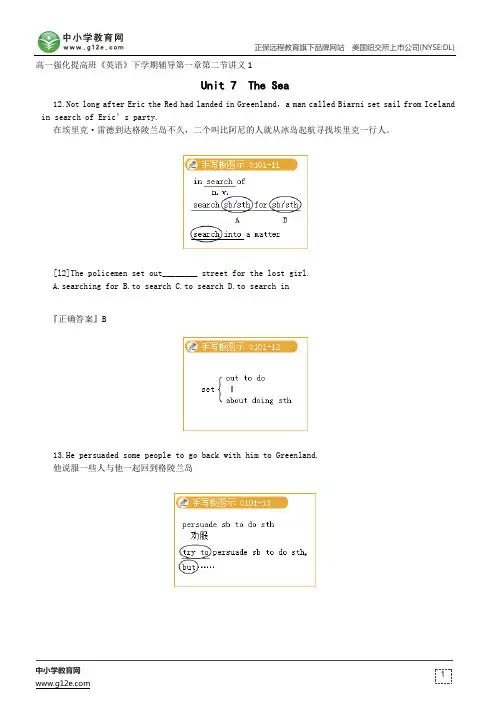
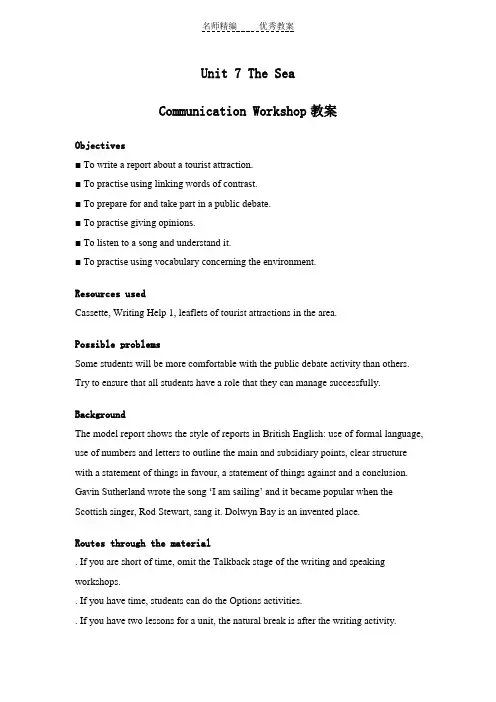
Unit 7 The SeaCommunication Workshop教案Objectives■ To write a report about a tourist attraction.■ To practise using linking words of contrast.■ To prepare for and take part in a public debate.■ To practise giving opinions.■ To listen to a song a nd understand it.■ To practise using vocabulary concerning the environment.Resources usedCassette, Writing Help 1, leaflets of tourist attractions in the area.Possible problemsSome students will be more comfortable with the public debate activity than others. Try to ensure that all students have a role that they can manage successfully.BackgroundThe model report shows the style of reports in British English: use of formal language, use of numbers and letters to outline the main and subsidiary points, clear structure with a statement of things in favour, a statement of things against and a conclusion. Gavin Sutherland wrote the song ‘I am sailing’ and it became popular when the Scottish singer, Rod Stewart, sang it. Dolwyn Bay is an invented place.Routes through the material. If you are short of time, omit the Talkback stage of the writing and speaking workshops.. If you have time, students can do the Options activities.. If you have two lessons for a unit, the natural break is after the writing activity.Language Power: pages 62-63.Writing: A ReportBefore you startExercise 1■ Go through the first example with the students.■ Students then work in pairs, making comments about the aquarium.■ Students can then make similar comme nts about their town or their school.Exercise 2■ Read the instructions and make sure students understand the task. Explain that students do not have to understand every word to carry out the task.■ Students read the report and match the paragraphs wi th the headings.■ Check students’ answers.Answers1 general description2 list of good points3 list of bad points4 conclusion■ Point out the heading of the report: What information does it give? How is this heading different from that of a formal letter? Make students aware of how clearly the information is recorded. A good report should have a very clear structure and use very clear language.Stage 1■ If you have any leaflets about tourist attractions in the area, bring them to class and use them to elicit a list of tourist attractions. Write them on the board.■ In groups, students discuss which of the attractions they like best. Tell them to consider the sort of people who like the attraction (adults? children? families?), the best time of year to visit the attraction, etc.■ Each member of the group chooses one attraction to write about. Tell students that they can invent an attraction if they wish.Stage 2■ Read the list of good and bad points about the aquarium with the class.■ Stud ents work individually, listing the good and bad points of the attraction they have chosen. Tell students they need not have an equal number of good and bad points. Go round and assist with ideas or new vocabulary if necessary.Stage 3■ Refer students t o Writing Help 1 for advice on layout, vocabulary and linking.■ Students plan the four paragraphs of the report.■ Students then write the heading and the first draft of the report.Stage 4■ Students check their drafts. Refer them to Writing Help 1 (checking). They should also use their own writing checklist based on the mistakes they have made in previous writing tasks.Talkback■ In groups, students read each other’s reports and discuss whether they agree with the opinions and conclusions in the reports.■ Read the example of how to report the conclusion to the rest of the class.■ One member of each group reports some of the group’s conclusions.Speaking: Public DebateBefore you startExercise 1Useful vocabulary: coastal, wildlife park, oil refinery.Students should be able to guess the general meaning of these words from the context. ■ Students read the text about Dolwyn Bay.■ Check students' understanding of the useful vocabulary and ask some comprehension questions, e.g. How many people live there? (8,000) Are there a lot of young people there? (no) What new industry will there be in Dolwyn Bay in the future? (oil industry).Exercise 2■ To start students thinking, you may wish to elicit one or two pros and cons of building a big oil refinery in Dolwyn Bay before students work in pairs.■ In pairs, students discuss and list the pros and cons of the plans to build a big oil refinery in Dolwyn Bay.■ The pairs then report back to the class and see whether, overall, there are more pro s or more cons.Exercise 3■ Students read through the list of people and then listen to the cassette.Answerthe owner of a fishing boatTapescriptSpeaker: I'm totally against the plan. I think it will be a disaster for the local area. For one thing, it will be terrible for fishing in the area. The oil refinery will pollute the sea and we won't be able to fish. It's difficult now, but this will be the end of the fishing industry. It would be much better if we put more money into the fishing industry. For example, we need money to build new fishing boats.■ Play the cassette again, pausing it to check students' understanding of disaster, pollute the sea.Stage 1Key Wordsbusiness, development, environment, fishing industry, jobs, marine life, noise, oil refinery, pollution, traffic, (un)employment, wildlife■ Go through the Key Words with the class, asking students to translate them or put them into a sentence in English.■ Look at the notes for the local shopkeeper with the class and see if students can add any more points to support his point of view.■ In groups, each student chooses a role from the list in Exercise 3 and writes notes about his/her opinions of the plans.Stage 2■ Read the Function File with the class, drawing students' attention to the use of stress to give emphasis to your opinion, e.g. I am totally against the plan.Students practise on their own, giving their opinions and stating their case.Stage 3■ Read through the example with the class and point out how one sp eaker stateshis/her case before the next speaker agrees or disagrees and then goes on to statehis/her case.■ Remind students that this is a ‘public debate’, not an informal conversation among friends. Each person is allowed to finish what they want to say before the next person speaks. If you wish, each group can appoint a chairperson to control the debate. (The chairperson then gives his/her opinions as a member of the community at the very beginning of the debate).■ In groups, students take turns to give their opinions. When everyone in the group has spoken, the group has a general discussion and tries to reach agreement about the plans for Dolwyn Bay.Talkback■ Each group reports back to the class, saying what plans they agreed on.Listening■ Students read through the text and guess the missing words.■ Then they listen to the song and complete the text.Answers and TapescriptI am sailing, I am sailing, home again, across the sea.I am sailing, stormy waters, to be near you, to be free.I am flying, I am flying, like a bird, across the sky.I am flying, passing high clouds, to be with you, to be free.Can you hear me? Can you hear me? Through the dark night, far away.I am dying, forever crying, to be with you, who can say?We are sailing, we are sailing, home again, across the sea.We are sailing, stormy waters, to be near you, to be free.■ Play the song again and ask further questions: ‘What is the situation in the song? Where is the person going? Who is he going to see? Is the p erson really sailing?’■ In pairs, students discuss what images are used to express the idea of ‘returning’ (sailing/flying like a bird), ‘feeling unhappy’ (crying/dying), ‘having difficulties’ (stormy waters).■ Students then discuss any other songs the y know about the sea ?C are these songs usually slow or fast? sad or happy?OptionsPracticeIn groups, students prepare a report about the plans to build a big oil refinery in Dolwyn Bay. Tell the students the report is for the local government authority and is written after the public debate they have just had.ExtensionIf there are any development plans currently affecting the students’ own region or country, the pros and cons of these plans can be discussed in class.。
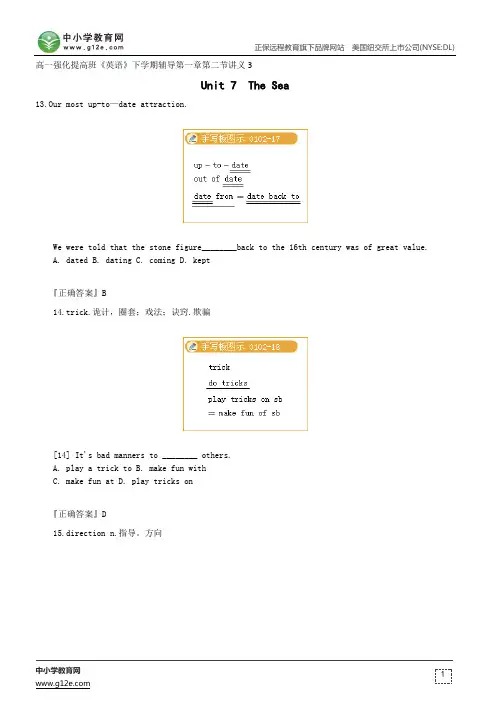
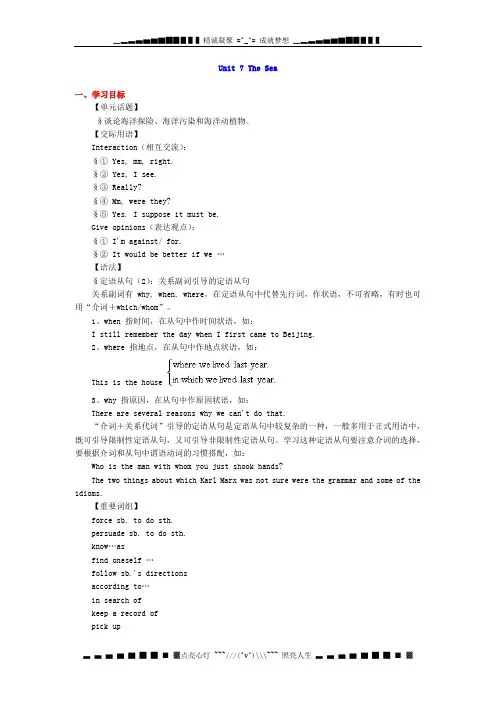
Unit 7 The Sea一、学习目标【单元话题】§谈论海洋探险、海洋污染和海洋动植物。
【交际用语】Interaction(相互交流):§① Yes, mm, right.§② Yes, I see.§③ Really?§④ Mm, were they?§⑤ Yes. I suppose it must be.Give opinions(表达观点):§① I'm against/ for.§② It would be better if we …【语法】§定语从句(2):关系副词引导的定语从句关系副词有why, when, where,在定语从句中代替先行词,作状语,不可省略,有时也可用“介词+which/whom”。
1、when 指时间,在从句中作时间状语,如:I still remember the day when I first came to Beijing.2、where 指地点,在从句中作地点状语,如:This is the house3、why 指原因,在从句中作原因状语,如:There are several reasons why we can't do that.“介词+关系代词”引导的定语从句是定语从句中较复杂的一种,一般多用于正式用语中,既可引导限制性定语从句,又可引导非限制性定语从句。
学习这种定语从句要注意介词的选择,要根据介词和从句中谓语动词的习惯搭配,如:Who is the man with whom you just shook hands?The two things about which Karl Marx was not sure were the grammar and some of the idioms.【重要词组】force sb. to do sth.persuade sb. to do sth.know…asfind oneself …follow sb.'s directionsaccording to…in search ofkeep a record ofpick upmore thanin the direction of…【写作】§能运用段落安排策略,用英语写出100词左右的报告,介绍一个旅游景点。
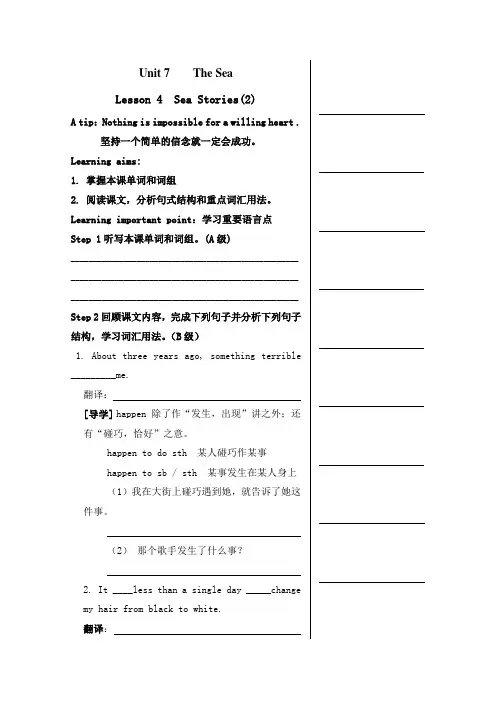
Unit 7 The SeaLesson 4 Sea Stories(2)A tip:Nothing is impossible for a willing heart .坚持一个简单的信念就一定会成功。
Learning aims:1. 掌握本课单词和词组2. 阅读课文,分析句式结构和重点词汇用法。
Learning important point:学习重要语言点Step 1听写本课单词和词组。
(A级)____________________________________________________ ____________________________________________________ ____________________________________________________ Step 2回顾课文内容,完成下列句子并分析下列句子结构,学习词汇用法。
(B级)1. About three years ago, something terrible _________me.翻译:[导学]happen 除了作“发生,出现”讲之外;还有“碰巧,恰好”之意。
happen to do sth 某人碰巧作某事happen to sb / sth 某事发生在某人身上(1)我在大街上碰巧遇到她,就告诉了她这件事。
(2)那个歌手发生了什么事?2. It ____less than a single day _____changemy hair from black to white.翻译:翻译:[导学](1). it takes sb some time to do sth 意为“做某事花了某人多少时间”eg: 他们用了三年时间修完这条路。
(2).spend的主语必须是人,常用于以下结构:a) spend time /money on sth. 在……上花费时间(金钱)。
例:这道数学题花了我两个小时。
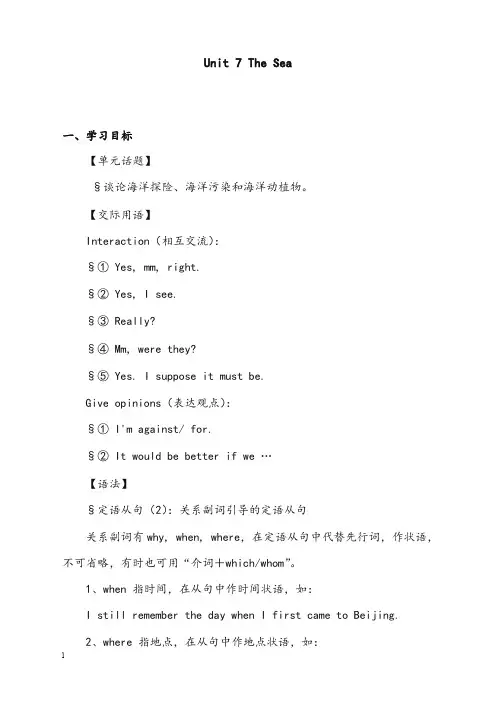
Unit 7 The Sea一、学习目标【单元话题】§谈论海洋探险、海洋污染和海洋动植物。
【交际用语】Interaction(相互交流):§① Yes, mm, right.§② Yes, I see.§③ Really?§④ Mm, were they?§⑤ Yes. I suppose it must be.Give opinions(表达观点):§① I'm against/ for.§② It would be better if we …【语法】§定语从句(2):关系副词引导的定语从句关系副词有why, when, where,在定语从句中代替先行词,作状语,不可省略,有时也可用“介词+which/whom”。
1、when 指时间,在从句中作时间状语,如:I still remember the day when I first came to Beijing.2、where 指地点,在从句中作地点状语,如:This is the house3、why 指原因,在从句中作原因状语,如:There are several reasons why we can't do that.“介词+关系代词”引导的定语从句是定语从句中较复杂的一种,一般多用于正式用语中,既可引导限制性定语从句,又可引导非限制性定语从句。
学习这种定语从句要注意介词的选择,要根据介词和从句中谓语动词的习惯搭配,如:Who is the man with whom you just shook hands?The two things about which Karl Marx was not sure were the grammar and some of the idioms.【重要词组】force sb. to do sth.persuade sb. to do sth.know…asfind oneself …follow sb.'s directionsaccording to…in search ofkeep a record ofpick upmore thanin the direction of…【写作】§能运用段落安排策略,用英语写出100词左右的报告,介绍一个旅游景点。
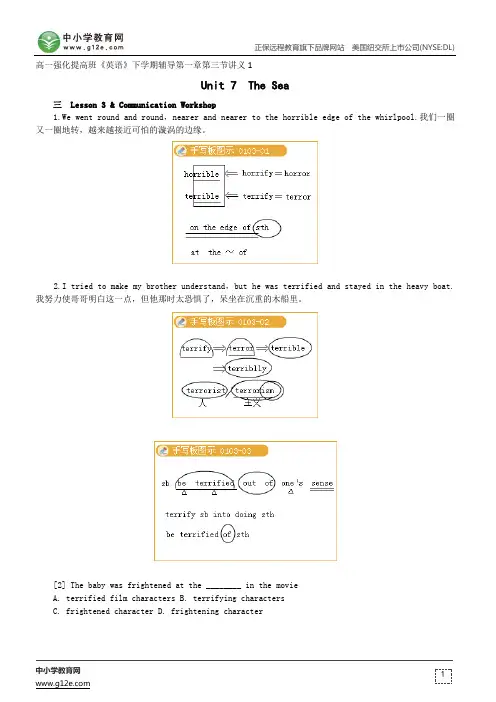
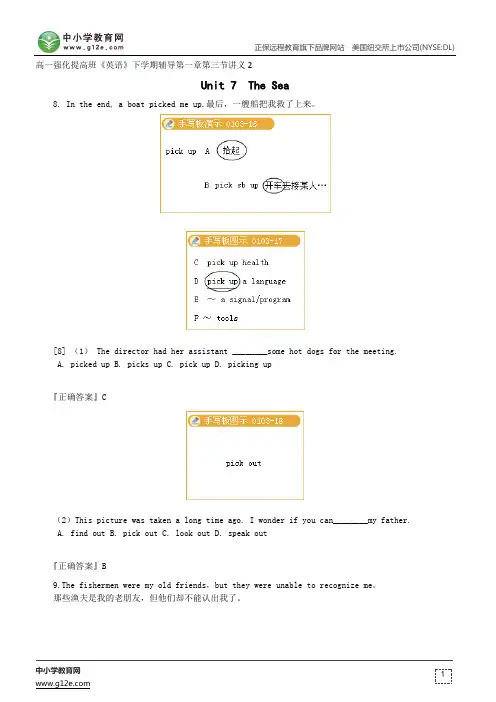
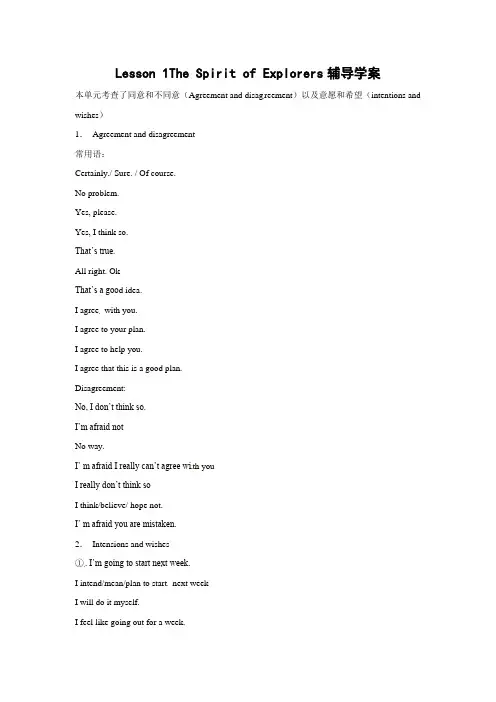
Lesson 1The Spirit of Explorers辅导学案本单元考查了同意和不同意(Agreement and disag reement)以及意愿和希望(intentions and wishes)1.Agreement and disagreement常用语:Certainly./ Sure. / Of course.No problem.Yes, please.Yes, I think so.That’s true.All right. OkThat’s a goo d idea.I agree with you.I agree to your plan.I agree to help you.I agree that this is a good plan.Disagreement:No, I don’t think so.I’m afraid notNo way.I’ m afraid I really can’t agree wi th youI really don’t think soI think/believe/ hope not.I’ m afraid you are mistaken.2.Intensions and wishes①. I’m going to start next week.I intend/mean/plan to start next weekI will do it myself.I feel like going out for a week.I’d like to go out go for a walk.I don’t want/hope to go with you.I’m not ready to go with you.I would rather not tell you.②. I want/hope/wish to go with you.I wish that you would go with me.I would do it if I should have the chance.I would like to go with you.If only I could see him③ I wish to see you again.I hope to become a doctor.I hope it stays fine.I wish I were youngerI hope so.二。
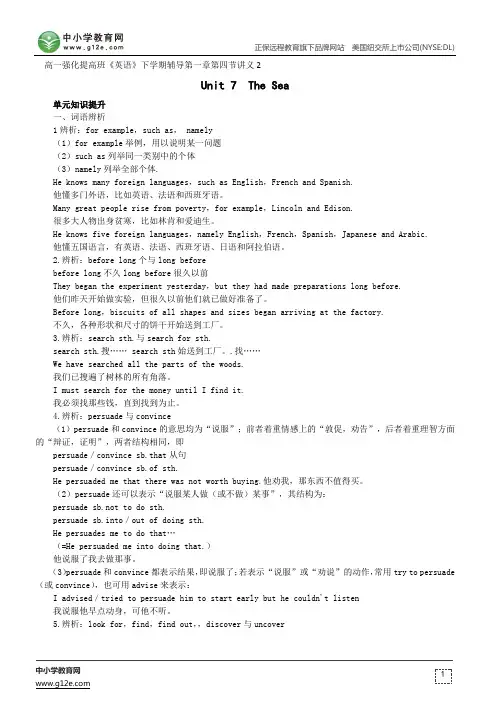
正保远程教育旗下品牌网站 美国纽交所上市公司(NYSE:DL)中小学教育网 高一强化提高班《英语》下学期辅导第一章第四节讲义2Unit 7 The Sea单元知识提升一、词语辨析1辨析:for example ,such as , namely(1)for example 举例,用以说明某一问题(2)such as 列举同一类别中的个体(3)namely 列举全部个体.He knows many foreign languages ,such as English ,French and Spanish.他懂多门外语,比如英语、法语和西班牙语。
Many great people rise from poverty ,for example ,Lincoln and Edison.很多大人物出身贫寒,比如林肯和爱迪生。
He knows five foreign languages ,namely English ,French ,Spanish ,Japanese and Arabic.他懂五国语言,有英语、法语、西班牙语、日语和阿拉伯语。
2.辨析:before long 个与long beforebefore long 不久long before 很久以前 They began the experiment yesterday ,but they had made preparations long before.他们昨天开始做实验,但很久以前他们就已做好准备了。
Before long ,biscuits of all shapes and sizes began arriving at the factory.不久,各种形状和尺寸的饼干开始送到工厂。
3.辨析:search sth.与search for sth.search sth.搜…… search sth 始送到工厂。
.找……We have searched all the parts of the woods.我们已搜遍了树林的所有角落。
Lesson1The Spirit of Explorers教案Teaching Aims:1. To practise reading for specific information.2. To practise using r elative clauses with when, where and why.3. To practise using relative clauses with prepositions and relative pronouns.4. To review and consolidate the relative pronouns.5. To talk about explorers.Teaching difficulties:To practise using relative clauses with when, where and why. Teaching Aids: computer and cassette.Teaching procedures:Ⅰ. Warming upT: Today we’re going to study un it 7 the Sea. Can you talk about anything about the sea? ( If students have difficulty the teacher gives them help, for example: What does the sea make you think?)S:T: The sea is beautiful and we can do some interesting games.( give some pictures to attract their attention and develop interest) The sea has special charm since ancient times human beings couldn’t help exploring it, such as Zheng he(slide) then give James cook and Columb us’s portrait, introduce their main deeds and ask them “Who are they?”S:T: They had the spirit of explorers, especially Columbus, he is famous all over the world. Why?S:T: People consider him to have discovered America first, do you think so?S:ⅡReadingTask 1 Now let’s read the text, you will get the right answer1.Which of the following people do you think arrived in America first?a. Christopher Columbusb. Ancient Romansc. Chinesed. VikingsStudents will get the right answer: Vikings arrived in America first. (Give slides 12, 13)Task 2 Read the text more carefully .Are these st atements true (T)or false(F)1. Eric the Red wanted to get a land which could be colonized so he decided to set sail further.2. Biarni se t sail from Iceland in order to join Leif’s father.3. Biarni discovered Greenland first.4. The Vikings were stronger and stronger in Northern Europe from the 8th to 10th century.5. According to official records Europeans reached America long before Columbus ever set sail.Answers: 1 F 2 F 3 F 4 T 5 FTask 3 Give a world map, Point at the island in turns, ask students to say its name and Vikings sailing route (slide) then do the exercise 2 Ⅲ SpeakingTask 1. Get students to read the text again for specific information about the three discoveries. Then in pairs, complete the table in Exercise3 with the information they get.Check the answers and then get students to read the text aloudTask 2. Read the text again a nd answer the following questions.Encourage students to work in pairs and ask as many questionsabout the text as they can.Check the answers in class.Encourage students to talk about the three discoveries in their own words.Task 3 Ask students if they know any other stories involving the Vikings .If they do, ask them to tell the class the story.Ⅳ Language StudyExercise 6 Find the words in the text that match most closely with the meaning of the words below.Language points:1. long before “在之前很久”They achieved this long before Columbus ever set sail.他们在哥伦布到达此地很久之前就已经来过这儿。
Unit 7 The sea (7)Lesson 4 Sea StoriesA tip:Every minute counts. 分秒必争Learning aims:1. 掌握重点单词和词组2.理解文章的意思,掌握阅读技巧Learning important point:学习语言知识,理解文章内容Learning difficult point:掌握连接词在文章中的用法Learning steps:Step 1: Words (A级)1. 漩涡2.可怕的,令人厌恶的3.浮,漂4.令人感到恐惧5.逃脱,逃跑6.恐怖,恐惧7.灵魂 8.幸存,生存下来9.恢复正常,康复 10.尖叫大叫Step 2: Pre-reading (A级)1.Ex.1 on Page14: Have you seen the film Titanic? Where did the story happen? Have you seen any other film about the sea? What did you think of it?2.Do Ex.2 Look at the key words and find them in the pictures. (barrel, cloud, fisherman, fishing boat, horizon, moon, wave, whirlpool)Step 3 Fast-reading (B级)1. Look at the pictures and try to put them in right order.2. Read each paragraph, please put Part A, B&C in the correct order.Decide a possible order for the paragraphs.3.Read them in that order to see if the story makes sense.Step 4 Carefully-reading1. True or False (B级)1).Writer can keep calm in time of danger2).In the whirlpool, only the writer survived. Both of his two brothers died.3).The three brothers first met the whirlpool and then were caught in the storm.4).It was the barrel that carried me to an area where the other fishermen were.5).The writer’s brother stayed in the heavy boat because he thought it was better to stay there.2. Answer the following questions : (C级)Part B1.Why did the writer’s younger brother fall into the sea ?2.Why did the boat go towards the whirlpool?Part A3.Why did the writer tie himself to a barrel ?4.Why didn’t his brother do the same ?Part C5.Why did his old friends not recognize him?Step 5 Post-reading(C级)Complete the sentences below with these words from the text.(afterwards, in the end, one day, suddenly, then, when)(1) in 1964, Robet Le Serrec was sailing near the Australian coast (2) he decided to stop near an island. (3) , he saw a huge creature resting beside his boat. He took a photograph, and (4) the creature swam away. (5) ,he showed the photograph to scientists, but(6) , nobody believed him.小结反思:Unit 7 The Sea 当堂检测卡(7)Lesson 4 Sea stories日期:班级:姓名:层次:评价:I.单词拼写:(A级)(1)With these Autumn rains the roof is beginning to (渗漏)(2)The swimmers were warned away from (漩涡)(3)The empty boat was (漂浮) on the sea .(4)He is the only one man who (幸存) after the fire .(5)He could (辨认)this man without difficulty .(6)Black and white are (反义词).(7)When we got there it had (下沉)into the watII. 短语归纳:(词语互译)(B级)1.在……边缘2.绕圈3.快速地4.把……绑在……5.受到惊吓6.潜入水中7.逃离8.为…所覆盖9.突然间10.put ……to one’s ear11.scream out12.in less than a minute13.soon afterwards14.more than15.similar to16.a variety of17.body temperature18.waste a lot energy doing19.believe it or not20.for…… pu rposeⅢ. 巩固课文:(根据课文内容填空,每空填一个单词)(C级)It may seems s________. When we were on the e_______ of the whirlpool. I felt calmer. Suddenly, we went over the edge, I thought my life was o______. The boat was on the inside of the huge w__________ and we were going around in circles a____ great speed. I saw clearly some objects in the whirlpool. My brother was t________ and stayed in the heavy boat. W______ waiting, I d______ into the sea to try and e________.I did escape at last. Some time after I left the boat, with my brother in it, it s_______ into the bottom of the whirlpool. The sky was clear , the wind was c_____ and the moon was s______. In the end, a boat p________ me up. I got safe.错因与纠正:。